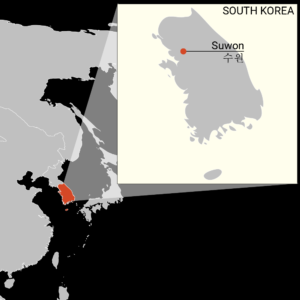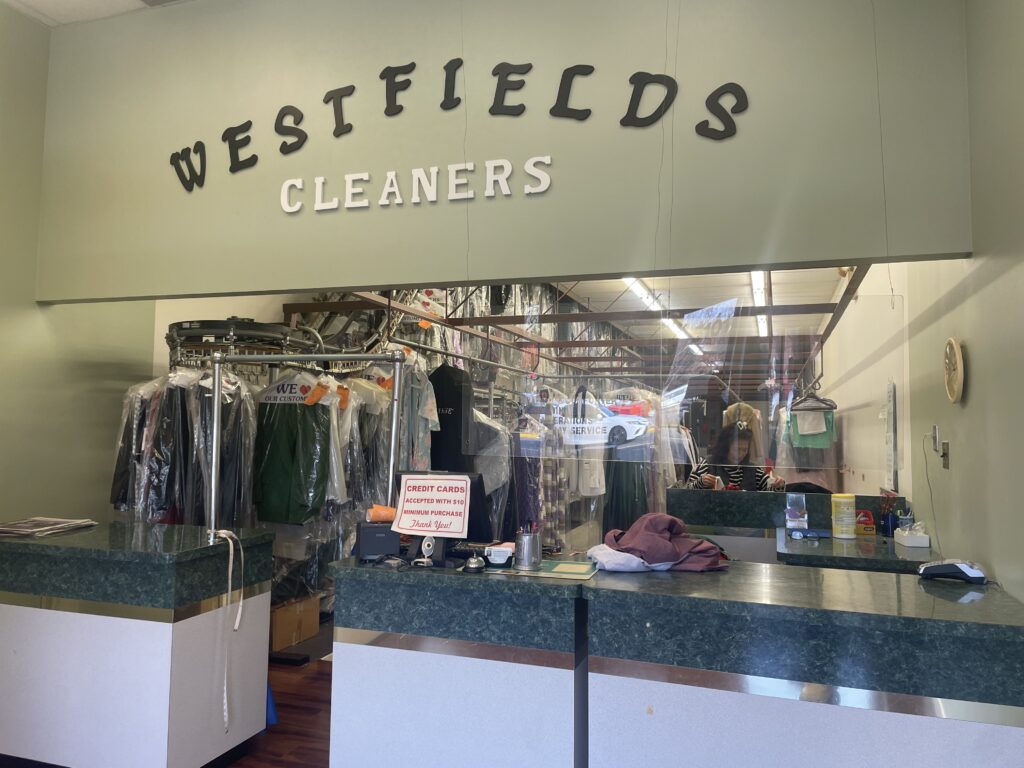
When Brigit Park cleans a military officer’s uniform, she prefers not to know their rank. It makes her nervous, she says, to think she might mess up a senior official’s uniform.
“I don’t work well under pressure. If I find out that I’m working on someone important, that catches me off guard. I’m like, ‘What? I worked for who?’” Park, 38, laughs. “I don’t want to ask. I don’t like to probe.”
Top Flight Cleaners, a small dry cleaners she has owned with her Korean American husband since 2016, sits in a strip mall across from the main gate of Joint Base Andrews, an Air Force base in Prince George’s County, Maryland.
Top Flight is just one of thousands of U.S. dry cleaners owned by Koreans who began immigrating to major U.S. cities in large numbers after the Immigration Act of 1965 removed restrictions on Asian immigrants to the United States.
There are about 80,000 Korean immigrants and their children in the Washington region, according to the Institute for Immigration Research at George Mason University. Of the 1,200 dry cleaners in the Washington region, in 2001, about 80% were owned by Korean immigrants or their American-born children, according to The Washington Post.
With limited English skills, many Korean immigrants went to work in corner produce or liquor stores when they first arrived, said Seong Minne Koh, a Korean lecturer at the University of Maryland and a Seoul native, in a recent interview with Capital News Service.
“At that time, a lot of people just moved here as labor workers.…Korean people are diligent, and they were also desperate. In a new country, where their English wasn’t good, what they could do was work hard.”
Some Koreans were already skilled seamstresses when they arrived. “The Korean people, we have small hands. We are good at crafting things,” Koh said. “Using hands is, I think, something we’re better at somehow.”
For Park, a typical morning begins with alterations for some of the 3,000 Navy and Air Force personnel on the base. As the only seamstress on the store’s staff of six, she works from opening at 7 a.m. to closing at 7 p.m. every day except Sunday, when the shop is closed.
Park sews, alone, in a small room within the store that is cluttered with spare uniform regalia and scraps of fabric. Customers trickle in and out. “It’s clearly non-stop,” she says. “As soon as we open, I get right into it.”
The bell rings, and she runs out to greet a guest.
“Hi, Ms. Harris, be right with you,” she calls out to an older woman dressed in camouflage who stands at the front counter, her son’s Air Force uniform in hand. The two exchange pleasantries, clearly familiar with each other. The exchange takes less than five minutes. And then Park returns to her area in the back, sewing an Air Force master sergeant patch onto a blue shirt.
Harris isn’t Park’s only repeat customer. Over the six years Park and her husband have operated their dry cleaners, they recognize more customers than not, she says. And though there is a dry cleaner on base, many service members choose to come to Park’s shop instead, she says.
“They go out of their way to come here and support us, which is amazing,” Park says.
Some customers aren’t just repeat; they’re returning after years away. One young military officer formerly stationed at Joint Base Andrews was deployed to Guam four years ago. When he returned, he came back to Top Flight Cleaners, Park says.
Though Park’s family originally comes from the Philippines, she has been connected to the Korean dry-cleaning industry for decades. When Park met her husband in a Virginia high school in 2003, she began helping at his parents’ dry cleaners in Temple Hills, Maryland. Immigrants from a Seoul suburb, Park’s in-laws still operate at that location.
By 2016, Park and her husband decided they wanted to own a shop of their own and moved to the larger location in Suitland.

Often, new customers assume Park is just a seamstress, not one of the owners. Despite being a mother of two college students, Park looks young for her age. She wears no makeup, and her usual work uniform is a pair of leggings and a loose T-shirt.
Dealing with rude customers is part of the job, she said. “I had a customer who called in who wanted her wedding gown done. When I respectfully declined, she…I don’t know how to say it…but I got ‘Karen’d’.”
“Karen” is slang for someone who is hard to work with, usually a woman. When she refused to take no for an answer, the customer demanded to speak to a supervisor—who turned out to be Park.
As the first wave of Korean immigrants began to earn more money, they broke into the dry cleaning industry, which required capital to own shops, Koh said. Dry cleaning offered other advantages, too; Many Koreans saw it as a clean and respectable business, and it offered an opportunity for a cash-only or cash-preferred business model with no credit card fees or other complications.
Within a decade, the Korean dry cleaning business had exploded in New York City as well. In 1978, there were about 100 Korean dry-cleaning businesses in the city. By late 1980s the 1,500, according to Kyeyoung Park, author of “The Korean American Dream: Immigrants and Small Business in New York City.”
Though many Korean immigrants and their U.S.-born children have moved onto higher education and higher-paying jobs in greater numbers, according to the Migration Policy Institute, some Korean dry cleaners have been in the Washington area for decades.
Kim Lyle has run Westfield Brite Cleaners in Centreville, Virginia, for decades with her sister. They are of a different era than Park. Lyle was born in 1955, two years after the war ravaged the Korean peninsula, including her hometown, the western city of Suwon.
During the war, Suwon was a hotbed for tensions between Northern and Southern forces; the city changed hands four times over the course of four years of war, according to the U.S. Army website.
Lyle emigrated to the West Coast and attended Lassen Community College, a small school in Susanville, California. It was a chance at a better life than the one she had in Suwon, she said.
She studied homemaking, sewing and alterations. In college, Lyle met her husband, currently an U.S. Air Force lieutenant colonel. His job took them across the country, from California, to Hawaii, to New Jersey, before settling down in the Washington area. More than 20 years ago, Lyle opened the cleaners with her sister.
Lyle says that she has kept a fairly consistent clientele for years.
“Customers come and go,” she said, “but if you’re good to them, the going won’t happen.”

You must be logged in to post a comment.